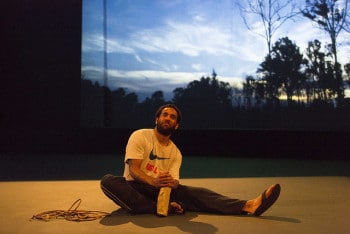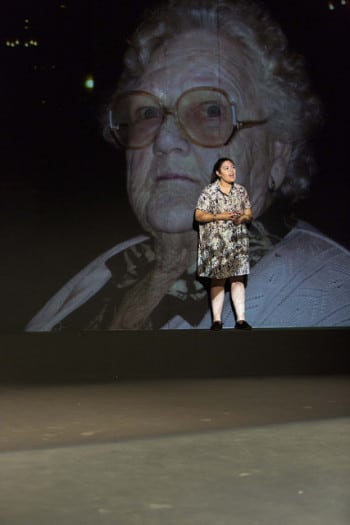Review: Kill the Messenger, Belvoir
Kill the Messenger is so alive that it constantly interrupts itself to remind the audience that it has a very real beating heart. Nakkiah Lui, playing herself, tears down the fourth wall of Kill The Messenger as soon as she climbs off Peter (Sam O’Sullivan), her love interest in the play. She remarks, wryly, that when she wrote the sex scene, she figured Miranda Tapsell would be playing her.
She then explains that the lines in this play are blurred because her original conceit – telling the story of a (real) man, Paul, and the systemic culture of racism that led to his death – was stalled when her grandmother fell through the floor of her housing commission home and died, because the commission’s governing body couldn’t be bothered coming out to replace the floorboards. So what else is there to do, really, but tear down the three remaining walls and look unflinchingly at the intersection of playwright and play, of reality and fiction, of personal and indirect grief?

It’s brilliant, and doggedly incomplete, and staunchly not definitive.
Lui is so essential and so wonderful on stage, playing her own avatar and anchoring the play with a playwright’s narration – this helps carry the dual storylines and smooth out transitions between scenes. It also creates a better sense of the work as a whole, why Lui presents it to us this way, how inextricable the play is from the tragedy in her family.
So we begin with Paul (Lasarus Ratuere), an Aboriginal man in constant pain, who has a fraught relationship with his sister Haley (Katie Beckett). When Haley goes to the hospital to collect his belongings before they’re thrown out, she runs into a nurse, Alex (Matthew Backer), whose name she remembers from the report on Paul’s death – he was the attending nurse, present through it all. She explodes over the senseless loss; he defends, and doesn’t, and explains, and doesn’t, stuck between addict stereotypes, racial prejudice, the normalisation of death in a hospital, and his still-intact ability to think and feel like a human being.

We also meet Lui and her boyfriend (at the time) Peter (O’Sullivan), and she talks about her grandmother, and she talks about this play she’s writing – Paul’s story – and when she and Paul cross paths on their way to the hospital it’s somehow so natural and expected and poignant. They’re funny (Lui has a delightfully sharp sense of comedy, which is no surprise to anyone who knows her work) and they’re funny together, a bantering interplay – the sort of thing that happens when you meet someone and you know, right away, for some reason, that you’re supposed to know them.
Ratuere is excellent as Paul, balancing his complex personal kaleidoscope with important humanity: fighting with his sister for money, charming Nakkiah, carrying his pain around with his addiction and the way his face talks us through his last few moments is heartbreaking.
Beckett’s Haley is deeply empathetic and skilfully performed, and so is Backer’s Alex; the two have a deeply naturalistic rhythm of speech, particularly in their scenes together, that reminds us just how damn real this play is. Part of that, too, is thanks to Anthea Williams direction, which keeps the play moving as quickly as it needs to carry the weight and rush of everything within it, but pulls back long enough to linger where it should: on projected photographs of Lui’s grandmother, on Paul’s gentle verbal sparring.
Lui tells us, over and over, that seeing a play about systemic racial oppression and its very real life-threatening dangers may assuage some sense of white guilt but really does nothing to help anyone in any real way. She asks us, every moment implicitly – and later explicitly – what, exactly, we’re going to do about the world we live in and its devastating injustice. All she can do is tell us about it. The rest is up to us.
This play is deeply, desperately political. It’s nakedly bursting with pain, and it’s compelling, and it’s Nakkiah Lui laid bare, all Nakkiah and still yet all of us, and it’s about loss and accountability and a challenge to the country to finally move forward with crucial change. There’s no resolution, because we don’t have one yet. Because we won’t change the structures in place here that let – encourage – Indigenous deaths, no matter how preventable. Even if all you have to do is run tests for their widespread pain, or fix the rotting floorboards in their house. Even if all you have to do is care.
What are you going to do about the world we live in?



